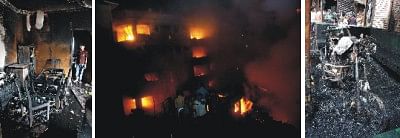We mourn and then forget

Photos: Anisur Rahman
SCARCELY had the nation come around from the trauma that Begunbari building collapse of Tuesday (June 1) caused, when it was jolted by yet another shock of a far more severe kind -- Thursday's (June 3) inferno at Nimtoli in the older part of the capital city.
The blaze that burnt to death some 117 inhabitants of four buildings at Nawab Katra at Nimtoli was perhaps the worst of its kind in living memory. Words fail to express fully the scale of devastation and death that the fire left in its wake. The nation observed a mourning day on Saturday (June 5) in memory of those who died in the Begunbari building collapse and Nimtoli fire.
We have been grieving over the unnatural deaths of our fellow people so often nowadays! The deaths from road accident, launch capsize, fire and stampede in the garment factories, violence inflicted by criminals of all make-up on their prey, storms and floods, hunger, disease and so on leave the families and communities saddened by them to mourn about every other day. Add to those the grievous wounds and deaths male violence metes out to hapless women regularly.
But to mourn the dead on a national scale, especially in big disasters like the ones that happened in Begunbari and Nimtoli, is an instance of greater compassion and respect that the country has ever shown to disaster victims. This act would certainly raise our status as a civilised people who hold the lives of their fellow citizens in the highest esteem.
Now will our responsibility end with this demonstration of sympathy, care and respect for the disaster victims alone? In the editorial of this paper last Sunday, it had been suggested that we should observe a National Accountability Day in memory of the fire and building collapse victims only because those responsible for the tragedies should also make themselves accountable to the nation.
The question naturally comes because, if one is to go by experience, the experience of past tragedies in which human error or failings of some kind had a role to play should have provided us with some lessons. But for all practical purposes, that has not happened. The reason for that is all too obvious.
The ability to draw a lesson from a bad experience attributable to human error or lapse requires that the subject in question also has the seriousness of mind, and the responsibility that goes with it, to learn. But from the manner in which the disasters are taking place one after another, it appears we have remained quite unperturbed by them.
This is why there is a need for a change in our attitude towards the misfortunes that are befalling us more often in recent times. That change should be from one of resignation to our fate to something that goads us to take responsibility for what has happened. The Begunbari or Nimtotoli disasters should have made us ready to take collective responsibility for the tragedies.
Take the Begunbari case. Without question, it was the engineer, the designer and the owner of the collapsed five-storey building who should primarily be held accountable for the manmade calamity. Next comes the role of the Rajdhani Unnoyon Kortripokkho (Rajuk), which is tasked with the job of ensuring that any building that springs up in the capital city follows the building codes properly, and monitoring and punishing those who are found to violate them.
But none of them has so far taken any responsibility for the fall of the building on nearby tin sheds and the loss of lives and damage to properties that it has caused. In the case of the Nimtoli blaze, on the other hand, it is the lack of breathing space due to unplanned construction of buildings, which stand wall-to-wall in Nimtoli as well as in other parts of what is known as old Dhaka, which is primarily the reason for such a large number of casualties in the conflagration.
Secondly, the practice of allowing factories that use highly explosive materials to make, for example, plastic goods and other commodities, should have been prohibited in such a densely-populated area. The reports on the circumstances of the Nimtoli conflagration show that the fire started with an explosion, which caused highly flammable substance to erupt, flowing like molten lava in the entire surroundings. It also created dense fumes that choked to death most of the inhabitants of the affected buildings.
It has, therefore, been an example of unpardonable lapse on the part of the authorities concerned to have waited for a catastrophe before awakening to the gravity of the problem -- or have they as yet?
To enforce rules is the job of the government, and it should be held liable for defaulting in that respect. But what about our own sense of responsibility as law-abiding citizens? Or must we have to be forever chased by the big stick to follow the rules?

 For all latest news, follow The Daily Star's Google News channel.
For all latest news, follow The Daily Star's Google News channel. 



Comments